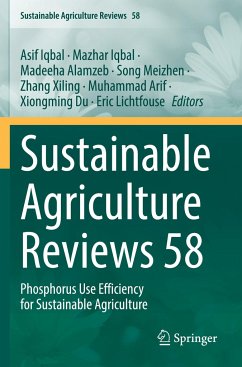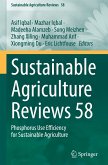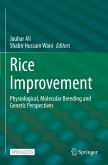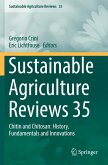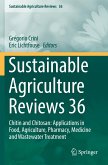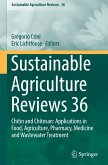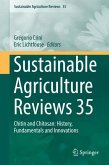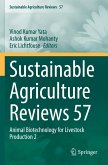Sustainable Agriculture Reviews 58
Phosphorus Use Efficiency for Sustainable Agriculture
Herausgegeben:Iqbal, Asif; Iqbal, Mazhar; Alamzeb, Madeeha; Meizhen, Song; Xiling, Zhang; Arif, Muhammad; Du, Xiongming; Lichtfouse, Eric
Sustainable Agriculture Reviews 58
Phosphorus Use Efficiency for Sustainable Agriculture
Herausgegeben:Iqbal, Asif; Iqbal, Mazhar; Alamzeb, Madeeha; Meizhen, Song; Xiling, Zhang; Arif, Muhammad; Du, Xiongming; Lichtfouse, Eric
- Broschiertes Buch
- Merkliste
- Auf die Merkliste
- Bewerten Bewerten
- Teilen
- Produkt teilen
- Produkterinnerung
- Produkterinnerung
This book presents recently-developed crop, soil, and management practices that can be used to improve phosphorous use efficiency in agriculture. Food security highly depends on the availability of plant nutrients such as phosphorus, yet rock phosphate reserves are expected to be exhausted in the next 50-100 years. Moreover, about 80% of the phosphorous fertilizers applied to soils become unavailable to plants due to phosphorous fixation in iron and aluminum oxides in acidic soils and with carbonates in alkaline soils. As a consequence, only 10-15% of applied phosphorous is up taken by crops.…mehr
Andere Kunden interessierten sich auch für
![Sustainable Agriculture Reviews 58 Sustainable Agriculture Reviews 58]() Sustainable Agriculture Reviews 58137,99 €
Sustainable Agriculture Reviews 58137,99 €![Rice Improvement Rice Improvement]() Rice Improvement33,99 €
Rice Improvement33,99 €![Sustainable Agriculture Reviews 35 Sustainable Agriculture Reviews 35]() Sustainable Agriculture Reviews 3581,99 €
Sustainable Agriculture Reviews 3581,99 €![Sustainable Agriculture Reviews 36 Sustainable Agriculture Reviews 36]() Sustainable Agriculture Reviews 3681,99 €
Sustainable Agriculture Reviews 3681,99 €![Sustainable Agriculture Reviews 36 Sustainable Agriculture Reviews 36]() Sustainable Agriculture Reviews 3681,99 €
Sustainable Agriculture Reviews 3681,99 €![Sustainable Agriculture Reviews 35 Sustainable Agriculture Reviews 35]() Sustainable Agriculture Reviews 3581,99 €
Sustainable Agriculture Reviews 3581,99 €![Sustainable Agriculture Reviews 57 Sustainable Agriculture Reviews 57]() Sustainable Agriculture Reviews 57161,99 €
Sustainable Agriculture Reviews 57161,99 €-
-
-
This book presents recently-developed crop, soil, and management practices that can be used to improve phosphorous use efficiency in agriculture. Food security highly depends on the availability of plant nutrients such as phosphorus, yet rock phosphate reserves are expected to be exhausted in the next 50-100 years. Moreover, about 80% of the phosphorous fertilizers applied to soils become unavailable to plants due to phosphorous fixation in iron and aluminum oxides in acidic soils and with carbonates in alkaline soils. As a consequence, only 10-15% of applied phosphorous is up taken by crops. Therefore, there is a need for advanced practices for improving phosphorus use efficiency.
Produktdetails
- Produktdetails
- Sustainable Agriculture Reviews 58
- Verlag: Springer / Springer International Publishing / Springer, Berlin
- Artikelnr. des Verlages: 978-3-031-16157-5
- 1st edition 2023
- Seitenzahl: 256
- Erscheinungstermin: 17. November 2023
- Englisch
- Abmessung: 235mm x 155mm x 15mm
- Gewicht: 394g
- ISBN-13: 9783031161575
- ISBN-10: 3031161572
- Artikelnr.: 69181385
- Herstellerkennzeichnung Die Herstellerinformationen sind derzeit nicht verfügbar.
- Sustainable Agriculture Reviews 58
- Verlag: Springer / Springer International Publishing / Springer, Berlin
- Artikelnr. des Verlages: 978-3-031-16157-5
- 1st edition 2023
- Seitenzahl: 256
- Erscheinungstermin: 17. November 2023
- Englisch
- Abmessung: 235mm x 155mm x 15mm
- Gewicht: 394g
- ISBN-13: 9783031161575
- ISBN-10: 3031161572
- Artikelnr.: 69181385
- Herstellerkennzeichnung Die Herstellerinformationen sind derzeit nicht verfügbar.
Dr. Asif Iqbal is Postdoctoral Fellow at Cotton Research Institute (CRI), Chinese Academy of Agriculture Sciences (CAAS), Anyang, Henan, China. His current research project is "The Physiological and Molecular Mechanisms of Phosphorus Use Efficiency in Cotton". He completed his Ph.D. on "The Physiological and Molecular Mechanisms of Nitrogen Use Efficiency in Cotton" from CRI, CAAS. He has worked in the areas of crop production, plant nutrition, and plant stress physiology at CRI, CAAS. His main research interests include genetic evaluation of crop germplasms for efficient nutrients utilization and adaptive mechanisms in crop plants under abiotic stresses, especially nutrient stress. He has been awarded Gold Medal in Master, Outstanding International Graduate Student in Ph.D. studies and also nominated for best thesis award by the Crop Science Committee of the Graduate School of Chinese Academy of Agricultural Sciences, China. He has been honored by different authorities due to his outstanding performance in the Department of Agronomy the University of Agriculture Peshawar, Pakistan. He has also received State Level Merit Scholarship for Master studies from Higher Education Commission (HEC), Pakistan, Chinese Government Scholarship for Ph.D. studies from the Chinese Scholarship Council, and an Outstanding Postdoctoral Fellowship from China Postdoctoral Organization and CRI, CAAS. He is the author and co-author of more than 50 peer-reviewed journal articles, 6 conference proceedings and abstracts, 3 chapters, 1 book, and 4 articles for growers. He is also serving as the editorial board member and reviewer for certain international peer-reviewed journals. Mr. Mazhar Iqbal is Lecturer in the Department of Botany Shaheed Benazir Bhutto University Sheringal Dir (U), Khyber Pakhtunkhwa (KPK), Pakistan since 2014. He has received his B.Sc (Hons) in Botany from the Department of Botany the University of Malakand, KPK, Pakistan. He has completed his Master of Philosophy in Botany (Weed Ecology and Physiology) from the University of Agriculture, Peshawar, Pakistan. He has worked in the areas of Phytosociology, Ethnobotany, and Weed Ecology. His main research interests include the identification and utilization of economic botanical flora of Northern Pakistan (Malakand Division) and the management of important weeds in major field crops. He has published many peer-reviewed articles and book chapters on important aspects of ethnobotany, weed ecology, crop production, and stress physiology in internationally renowned publishers. He has organized and attended many national and international conferences in Pakistan. He has supervised three B.Sc (Hons) students and four M.Sc students as the main supervisor and one as a co-supervisor. He has been associated with Teaching, Research, and Administration in the field of Biological Sciences. Dr. Madeeha Alamzeb is Assistant Director Plant Protection in the Directorate of Agriculture Extension, Peshawar, Pakistan. She has received her BSc (Hons) and MSc (Hons) in Agriculture (Agronomy) with distinction from the Department of Agronomy, the University of Agriculture, Peshawar, Pakistan. She completed her Ph.D. on "Phosphorous Source Management With and Without Phosphate Solubilizing Bacteria and Rhizobium for Improving Chickpea Productivity" from the Department of Agronomy, the University of Agriculture, Peshawar, Pakistan. Her main research interests include integrated nutrients management, crop production, protection, and physiology. She has published many peer-reviewed articles book and book chapters on important aspects of crop production, nutrients management, and stress physiology in internationally renowned publishers. She has attended many national and international conferences in Pakistan. Presently, she has been associated with Research and Administration in the field of Plant Nutrition and Protection Sciences. Dr. Meizhen Song is a professor/researcher in Cotton Research Institute (CRI), Chinese Academy of Agriculture Sciences (CAAS), Anyang, Henan, China since 1986. She is the head of the cotton standardization and technology group of CRI, CAAS. She is involved in cotton genetics and breeding, physiology and molecular biology for high nutrients efficient genotypes and the development of wide early maturing cotton genotypes and high-efficiency cultivation. She has supervised many national and international master and Ph.D. students. She has been the author of many peer-reviewed articles, books, and book chapters. As a key speaker, she attended national and international conferences, congress, symposia, and workshops. She has been honored by different authorities due to her outstanding performance in the field of research and education. Mr. Zhang Xiling is Professor/Researcher in Cotton Research Institute (CRI), Chinese Academy of Agriculture Sciences (CAAS), Anyang, Henan, China since 1987. He is involved in cotton genetic breeding, farming and cultivation, cotton industry development, cotton southern propagation, Xinjiang cotton issues and other research work. Previously, he served as the Director of the East Field, the Deputy Director of the Agricultural Management Division, and the Chief Field Manager of the Experimental Farm of CRI, CAAS, Deputy General Manager of Science and Technology Trading Company, Deputy Director of Industrial Development Division, Director of Hainan Breeding Center, Director of Hainan Scientific Research Center. Currently, he is working as Director of the Scientific Research Center, Director of the Logistics Center, Director of the Achievement Transformation Division, and Deputy Director of Cotton Research Institute. He is the main author of the "Three-Field System Reform Plan for the Experimental Farm of the CRI, CAAS". He is the main pioneer in the construction of the Sanya base ofthe CRI, CAAS and the research on the southern propagation of cotton in China. He has won third prize of the Ministry of Agriculture's Science and Technology Progress Award (1990), second (1994), and third prize of the National Science and Technology Progress Award (1996), Hainan Province prize in Science and Technology (2010) and second prize for the Chinese Agricultural Science and Technology Award of the Ministry of Agriculture (2011). He edited and published many books on cotton production, published more than 20 scientific papers as the first author, and obtained 3 national invention patents. Dr. Muhammad Arif is Professor in the department of Agronomy, the University of Agriculture Peshawar, Pakistan. He started his career in the same department as farm manager/lecturer after MS in 2000 and got Ph.D. degree in 2005 from the same department. He went to UK for pursuing his postdoctoral research in 2008. His main area of interest is seed priming, crop nutrition and dual purpose technology development and using biochar and compost as soil amendments for improving soil fertility and productivity. He got Silver Medal during MS in 1999 and Research Productivity Award for the year 2011 and 2012 and Best Teacher Award from HEC for the year 2016-2017. He is also member of many national and international societies. He is working as reviewer for more than a dozen national and international journals. He has published more than 150 research articles in internarial repute journals. He has been actively involved in conducting farmers', students' and researcher's trainings. He has successfully completed four research projects and currently working as PI of four research projects sponsored by USAID, PSF, DoST and HEC. He has remained on many administrative positions like Administrative officer, Director Administration, Manager ORICs. Currently, he is working as Director Farms and Additional Director ORICs in addition to his own duties. He has vast experience of project proposal writing, project execution, report writing, consultant to agriculture related projects. He is also actively involved in conducting conferences, seminars, trainings and surveys. He has closely worked with FAO in conducting trainings at the University and tribal districts like Bajaur and Mohmand (previously FATA), upper and lower Dir. He has successfully completed third party validation of Insaf Food Security program of KP in DI Khan. He has worked with Norwegian Church Aid (NCA) and conducted trainings in DI Khan for them. He also conducted trainings for the farmers of FR-Peshawar, FR-Kohat, FR-Bannu, FR-Lakki Marwat, FR-Tank, FR-D.I. Khan sponsored by Project for Area Development, Agriculture Extension FATA. He has also vast experience in working with different national and international organization like FAO, CIMMYT, ICARDA, USAID, PSF, DoST and HEC. Dr. Xiongming Du is Professor in the Cotton Research Institute (CRI), Chinese Academy of Agriculture Sciences (CAAS), Anyang, Henan, China. He is the principal investigator of the Cotton Germplasm Research Group in CRI, CAAS since 2000 and Dean of Cotton Germplasm Division in CRI, CAAS. He is the ICGI Co-chair (2015-2017) and Chair (2017-2019) of Germplasm & Genetic Stocks Research Area and General Information. He is also the seventh council member of academic committee of Cotton in China since 2012. The fourth and fifth council member of branch association of genetic resources under Association of Chinese Agronomy since 2000, and the member of Editorial Board of Journal of Plant genetics resources since 2007. He has won various projects like National Research and Development program, National High Technology (863 plan) project, and National Science fund etc. He has been engaged in the research of cotton genetic and molecular biological characteristics identification, genetic resources and biodiversity. He Led the team to establish and improve the collaborative network and public service platform for the collection, preservation, identification and evaluation of Cotton Germplasm Resources in China. Combined with population genetics, genome-wide association analysis and molecular biology, the phenotype and genotype of a large number of cotton resources were accurately identified, and the molecular mechanism of genetic differentiation and evolution of cotton population and the formation of elite traits were analyzed. The innovative method of excellent materials was established, high-quality cotton, color cotton and other characteristic varieties and germplasm resources were obtained, the inheritance and variation mechanism of color cotton fiber color were studied. He won the second national innovation award in 2020. He has published 48 SCI papers in the journals of Nature Genetics, New phytologist, Plant Journal, Industrial Crops and Products, Theoretical and Applied Genetics, Science China_Life Sciences as first or corresponding author. Dr. Eric Lichtfouse is Professor at Aix-Marseille University, France. He has invented carbon-13 dating, a method allowing for measurement of the relative age of organic molecules occurring in different temporal pools of complex media. He is teaching scientific writing and communication and has published the book Scientific Writing for Impact Factors, which includes a new tool - the Micro-Article- to identify the novelty of research results. He is founder and Chief Editor of scientific journals and series in environmental chemistry and agriculture. He has founded the European Association of Chemistry and the Environment. He got the Analytical Chemistry Prize by the French Chemical Society, the Grand Prize of the Universities of Nancy and Metz, and a Journal Citation Award by the Essential Indicators.
1. Permaculture principles, practices, and environmentalism (Jungho Suh).- 2. Sources and solubilization of phosphatic fertilizers (Waleed Fouad Abobatta, Amr Mahmoud Abdel Gawad, Haythum M. Salem, Mohamed A. Abdel-Salam, Taghred A. Hashim).- 3. Organic phosphorous as an alternative to mineral phosphatic fertilizers (Muhammad Zaina, Muhammad Adeelb, Noman Shakoor, Muhammad Arslan Ahmad, Saliha Maqboole, Jiusheng Li, Shafeeq Ur-Rahman, Xu Ming, Asif Iqbal, Waqar Afzal Malik, Aiwang Duan).- 4. Adaptive responses of crop species against phosphorus deficiency (Mehtab Muhammad Aslam, Aisha Lawan Idris, Eyalira Jacob Okal, Muhammad Waseem).- 5. Biochar for sustainable phosphorus management in agroecosystems (Komel Jehangir, Muhammad Riaz, Rashid Mahmood, Muhammad Arif).- 6. Phenotyping for assessing genotypic variation in phosphorus use efficiency (Amjad Farooq, Waqas Shafqat Chattha, Muhammad Tehseen Azhar, Azeem Iqbal Khan, Amir Shakeel).- 7. Advanced biotechnological tools for improving phosphorus 1 use efficiency (Hafiza Aasia Malik, Atta Ur Rahman, Fazal Akbar, Nisar Ahmad, Syed Shujait Ali, Muhammad Suleman, Shahid Ali, Zahid Hussain, Nasib Zaman, Akhtar Rasool, Muzafar Shah, Muhammad Israr, Asif Iqbal).- 8. Role of arbuscular mycorrhizal fungi in plant phosphorus acquisition for sustainable agriculture (Muhammad Riaz, Muhammad Tehseen Azhar, Muhammad Kamran, Omar Aziz, Xiurong Wang).- 9. Phosphorus cycle enzymes to remedy soil phosphorus deficiency (Alhassan Idris Gabasawa).- 10. Phosphorus nutrition enhancement of biological nitrogen 1 fixation in pastures (Suleiman Kehinde Bello1, Taofeek Olatunbosun Muraina, Saheed Olaide Jimoh, Ibraheem Olamide Olasupo, Samaila Usman).- Index.
1. Permaculture principles, practices, and environmentalism (Jungho Suh).- 2. Sources and solubilization of phosphatic fertilizers (Waleed Fouad Abobatta, Amr Mahmoud Abdel Gawad, Haythum M. Salem, Mohamed A. Abdel-Salam, Taghred A. Hashim).- 3. Organic phosphorous as an alternative to mineral phosphatic fertilizers (Muhammad Zaina, Muhammad Adeelb, Noman Shakoor, Muhammad Arslan Ahmad, Saliha Maqboole, Jiusheng Li, Shafeeq Ur-Rahman, Xu Ming, Asif Iqbal, Waqar Afzal Malik, Aiwang Duan).- 4. Adaptive responses of crop species against phosphorus deficiency (Mehtab Muhammad Aslam, Aisha Lawan Idris, Eyalira Jacob Okal, Muhammad Waseem).- 5. Biochar for sustainable phosphorus management in agroecosystems (Komel Jehangir, Muhammad Riaz, Rashid Mahmood, Muhammad Arif).- 6. Phenotyping for assessing genotypic variation in phosphorus use efficiency (Amjad Farooq, Waqas Shafqat Chattha, Muhammad Tehseen Azhar, Azeem Iqbal Khan, Amir Shakeel).- 7. Advanced biotechnological tools for improving phosphorus 1 use efficiency (Hafiza Aasia Malik, Atta Ur Rahman, Fazal Akbar, Nisar Ahmad, Syed Shujait Ali, Muhammad Suleman, Shahid Ali, Zahid Hussain, Nasib Zaman, Akhtar Rasool, Muzafar Shah, Muhammad Israr, Asif Iqbal).- 8. Role of arbuscular mycorrhizal fungi in plant phosphorus acquisition for sustainable agriculture (Muhammad Riaz, Muhammad Tehseen Azhar, Muhammad Kamran, Omar Aziz, Xiurong Wang).- 9. Phosphorus cycle enzymes to remedy soil phosphorus deficiency (Alhassan Idris Gabasawa).- 10. Phosphorus nutrition enhancement of biological nitrogen 1 fixation in pastures (Suleiman Kehinde Bello1, Taofeek Olatunbosun Muraina, Saheed Olaide Jimoh, Ibraheem Olamide Olasupo, Samaila Usman).- Index.

